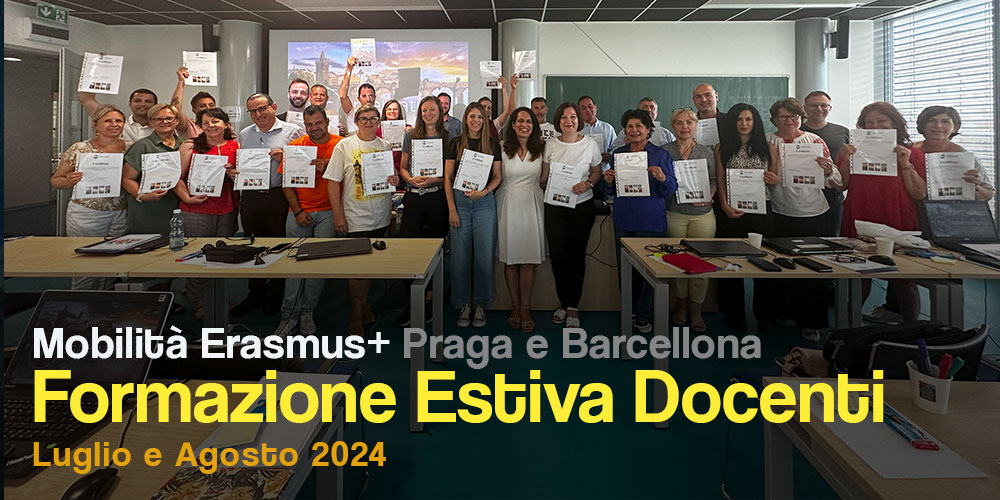
Accreditamento Erasmus+ – Convenzione 2023
Luglio – Agosto 2024
Nel periodo estivo cinque docenti della nostra scuola hanno avuto l’opportunità di seguire un corso di una settimana di metodologia didattica in lingua Inglese cofinanziata dal progetto di Accreditamento scolastico Erasmus+ 2021-2027, vinto dalla nostra suola nel 2020. I centri di formazione sono stati selezionati dal sito School Gateway.
Nello specifico:
Giada Chioso, docente di Scienze Motorie ha seguito il corso: Universal Design for Learning – A holistic approach presso l’ITC International Training Centre nella sede di Praga.
Matteo Adami e Valentina Tallamona, docenti di italiano hanno seguito il corso: Going Digital in an Innovative Classroom presso l’ITC International Training Centre nella sede di Praga.
Alessandro Brasile e Valeria Spera hanno seguito il corso: Design the Positive: Positive Thinking, Positive Communication and Positive School Spaces presso il centro Teacher Academy nella sede di Barcellona.
Alla fine della mobilità i docenti hanno avuto modo di illustrare quanto appreso durante l’evento di disseminazione del 1 ottobre 2024 come da programma qui sotto allegato con il link per il collegamento video:
Disseminazione per la Convenzione 2023
Greta Serena Calvi
Coordinatore del progetto
Presentazione dei corsi
Giada Chioso
Universal Design for Learning
Risultati di apprendimento per il corso: “Universal Design for Learning – A holistic approach presso l’ITC International Training Centre”.
- Master techniques for effectively teaching in diverse classrooms. Learn to promote inclusion and active societal participation, aligning with UDL’s commitment to creating a barrier-free, inclusive learning environment
- A comprehensive understanding of UDL principles and their application in the classroom.
- Skills to curate an inclusive learning environment that caters to diverse learning needs
- Enhance the application of UDL principles to create engaging, accessible learning experiences for all students.
- Learn how to leverage ICT to drive modernization changes, aligning with the UDL principle of using multiple means of representation.
- Cultivate a toolkit of ready-to-use materials and ideas to drive school or organizational development in innovative education, emphasizing a UDL-aligned interdisciplinary and holistic approach.
- Learn to motivate, guide and effectively assess to reduce low achievement in basic competences, promote peer exchange and active participation within the education.
- Learn to motivate, guide, and assess students effectively to minimize achievement gaps. Emphasize peer exchange and active participation within the education system, consistent with UDL’s principle of multiple means of engagement.
- Reflect upon and build personal and professional competencies. Gain confidence in promoting innovative pedagogies that are responsive to social and cultural diversity, adhering to the spirit of UDL.
- Network with educators from diverse nationalities within the EU, engaging in cross-cultural learning experiences, exchanging ideas and building a foundation for future international cooperation within the UDL framework.
- Gain a broader understanding of educational practices, policies, and systems of different countries. Cultivate mutual respect, intercultural awareness, and embed common educational and training values, all within the UDL perspective.
- Enrich communication skills, improve foreign language competencies, expand professional vocabulary, and promote the EU’s broad linguistic diversity, aligning with UDL’s principle of multiple means of representation and expression.
Valentina Tallamona e Matteo Adami
Going Digital in an Innovative Classroom
Risultati di apprendimento per il corso: “Going Digital in an Innovative Classroom”
- Enhance skills to use various innovative teaching methods and techniques that are learner-centred, encourage solving of meaningful real-world tasks and develop transversal competencies.
- Boost skills in using open and digital resources, support development of digital skills and media literacy, increase capacity to trigger changes in terms of modernization using ICT.
- Generate ready‐to‐use materials and ideas to support school or organisational development in the field of innovative education with regards to interdisciplinary and holistic approach.
- Gain techniques for working with heterogeneous classrooms, support inclusion of various minorities into mainstream education based on democratic values, promote active participation in society.
- Develop relevant, high-level skills such as creativity, critical thinking, metacognition and other key competences through innovative teaching methods, enhance good quality of mainstream education.
- Learn to motivate, guide and effectively assess to reduce low achievement in basic competences, promote peer exchange and active participation within the education.
- Revise and develop personal and professional competences, build confidence in promoting innovative and active pedagogies that are responsive to social and cultural diversity.
- Meet colleagues of different nationalities within the EU, engage in cross-cultural learning experience, exchange ideas and build a network for future international cooperation.
- Gain broader understanding of practices, policies and systems of education of different countries, cultivate mutual respect, intercultural awareness and embed common educational and training values.
- Enrich communication skills, improve foreign language competencies, broaden professional vocabulary and promote EU’s broad linguistic diversity.
Alessandro Brasile e Valeria Spera
Design the Positive
Risultati di apprendimento per il corso: “Design the Positive: Positive Thinking, Positive Communication and Positive School Spaces”
- Practice and enhance positive thinking, reduce negative self-criticism, practice gratitude, humor, and mindfulness;
- Practice positive communication with themselves, students, and colleagues, and share it concretely once back to school;
- Create a positive, pleasant environment in and outside the classroom through sustainable design and decoration principles;
- Create a project for themselves and for the school based on positive design possibly applicable once to school.
